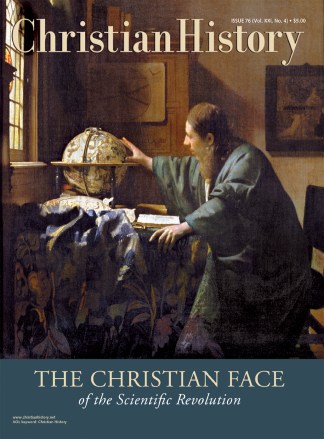During the last years of Antony van Leeuwenhoek’s (say it “la´vnhook´”) life, dignitaries from all over Europe, including Russian czar Peter the Great, King James II, and Frederick II of Prussia, visited his shop in Delft, Holland, to see the wonders revealed by his microscopes. But the Dutch cloth merchant seemed unaffected, retaining the delight of discovery that had first led him, at age 40, to focus a new lens on a world formerly unseen.
Until his death at 91, Leeuwenhoek spent his days grinding pinhead-sized lenses and peering through them, hour after hour, by candlelight. For this Christian layman-scientist, the astonishing array of tiny life-forms revealed under his homemade lenses glorified God as much as the brightest stars.
Born in Delft in 1632, Antony became a draper and only took up scientific studies as a hobby after seeing micrographs during a visit to London in 1660. He did not invent the microscope but took it to new levels of power. In the process he opened up to human eyes the world of microorganisms and founded a new branch of science: microbiology.
By 1673, Leeuwenhoek was discovering things with his superior microscopes that no human eye had ever seen. These he began sharing in letters to the natural philosophers of the Royal Society of London. The British scientists were at first skeptical of the claims by this untrained layman who spoke only Dutch.
When in 1676 he described finding microorganisms that were so small that “ten thousand of these living creatures could scarce equal the bulk of a coarse sand grain,” they requested corroboration from other eyewitnesses. Several friends sent affidavits that they also saw these things through Antony’s microscope. As Leeuwenhoek’s observations were found to be accurate, his reputation grew, and by 1680 he was elected a fellow of the Royal Society.
Though he would never revisit London or attend a meeting, the amateur microscopist kept up a lively correspondence with the British scientists, who translated hundreds of his letters and published them in their Philosophical Transactions.
Leeuwenhoek’s letters sparkle with the excitement of discovery. Describing the “wee animalcules” (protozoa and bacteria) he observed in a drop of fresh water, he wrote, “The motion of most of them in the water was so swift, and so various, upwards, downwards, and roundabout, that I admit I could not but wonder at it. I judge that some of these little creatures were above a thousand times smaller than the smallest ones which I have hitherto seen. … Some of these are so exceedingly small that millions of millions might be contained in a single drop of water.”
Leeuwenhoek investigated almost anything he could mount, exemplifying technical skill that would become a model for others. He was the first to observe bacteria, rotifers and protists like Vorticella and Volvox. He observed blood cells and was the first to see the whiplike action of sperm cells.
He advanced proofs against the doctrine of spontaneous generation that was popular in his day. This was the idea that living things emerge spontaneously from inanimate matter: shellfish from sand, maggots from meat, and weevils from wheat. He observed the complete life cycle of ants, fleas, mussels, eels, and various insects, proving that all organisms have parents.
Fearfully and wonderfully made
Born into the Dutch Reformed tradition, which encouraged man’s investigation of God’s handiwork in nature, Leeuwenhoek shared with Robert Boyle and other “new philosophers” of science a concern to glorify God and benefit humankind through his research. He laced his writings with exclamations of the greatness and wisdom of the God who created the wonders he saw through his lenses. He marvelled at the perfection the Creator had built into even the tiniest, most hidden facets of Creation.
His stand against the myth of spontaneous generation was also a defense of the biblical doctrine of Creation against the incipient materialism that led Robert Boyle to establish his famous lectures (see “Newton vs. ‘Newton,'” p. 30). The Dutch microscopist believed it foolish to think his “animalcules” could have formed by chance, and he worked diligently to prove that all things reproduce after their kind, as the book of Genesis teaches.
After working for weeks observing the propagation of insects, for example, Leeuwenhoek stated confidently, “This must appear wonderful, and be a confirmation of the principle that all living creatures deduce their origin from those which were formed at the Beginning.”
Leeuwenhoek died in 1723, shortly after dictating a final set of observations to the Royal Society.
Microscopy has come a long way since then; scientists now use electron microscopes which, at 100,000x, are investigating wonders more amazing than Leeuwenhoek could have imagined: DNA, molecular motors, and the machinery of the cell.
With what captivated wonder—and what praises to God—would such discoveries be greeted by this untrained layman whose insatiable curiosity led him to open to science the frontier of the minuscule?
David F. Coppedge is a network engineer at NASA’s Jet Propulsion Laboratory and president of the Bible-Science Association, San Fernando Valley, California.
Copyright © 2002 by the author or Christianity Today/Christian History magazine. Click here for reprint information on Christian History.










